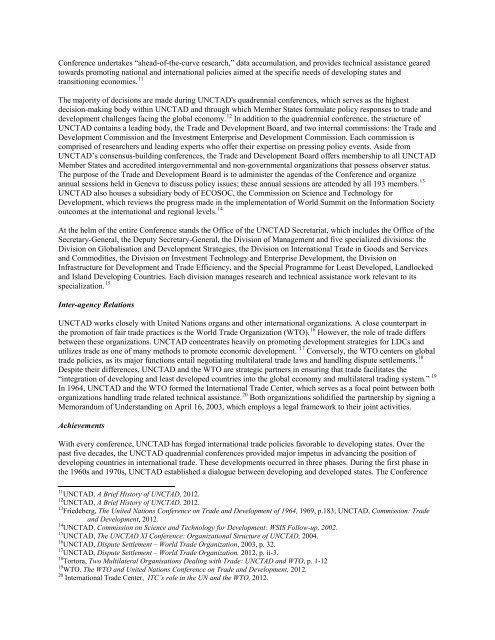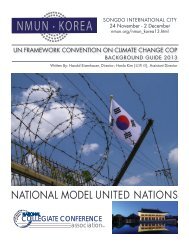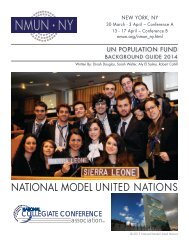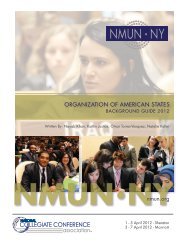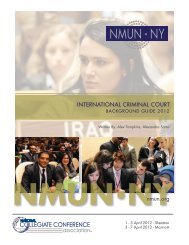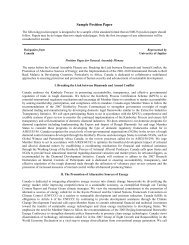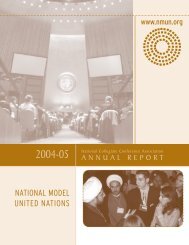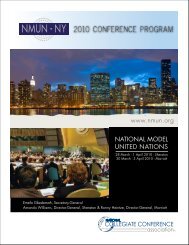UNCTAD Background Guide - National Model United Nations
UNCTAD Background Guide - National Model United Nations
UNCTAD Background Guide - National Model United Nations
You also want an ePaper? Increase the reach of your titles
YUMPU automatically turns print PDFs into web optimized ePapers that Google loves.
Conference undertakes “ahead-of-the-curve research,” data accumulation, and provides technical assistance geared<br />
towards promoting national and international policies aimed at the specific needs of developing states and<br />
transitioning economies. 11<br />
The majority of decisions are made during <strong>UNCTAD</strong>'s quadrennial conferences, which serves as the highest<br />
decision-making body within <strong>UNCTAD</strong> and through which Member States formulate policy responses to trade and<br />
development challenges facing the global economy. 12 In addition to the quadrennial conference, the structure of<br />
<strong>UNCTAD</strong> contains a leading body, the Trade and Development Board, and two internal commissions: the Trade and<br />
Development Commission and the Investment Enterprise and Development Commission. Each commission is<br />
comprised of researchers and leading experts who offer their expertise on pressing policy events. Aside from<br />
<strong>UNCTAD</strong>’s consensus-building conferences, the Trade and Development Board offers membership to all <strong>UNCTAD</strong><br />
Member States and accredited intergovernmental and non-governmental organizations that possess observer status.<br />
The purpose of the Trade and Development Board is to administer the agendas of the Conference and organize<br />
annual sessions held in Geneva to discuss policy issues; these annual sessions are attended by all 193 members. 13<br />
<strong>UNCTAD</strong> also houses a subsidiary body of ECOSOC, the Commission on Science and Technology for<br />
Development, which reviews the progress made in the implementation of World Summit on the Information Society<br />
outcomes at the international and regional levels. 14<br />
At the helm of the entire Conference stands the Office of the <strong>UNCTAD</strong> Secretariat, which includes the Office of the<br />
Secretary-General, the Deputy Secretary-General, the Division of Management and five specialized divisions: the<br />
Division on Globalisation and Development Strategies, the Division on International Trade in Goods and Services<br />
and Commodities, the Division on Investment Technology and Enterprise Development, the Division on<br />
Infrastructure for Development and Trade Efficiency, and the Special Programme for Least Developed, Landlocked<br />
and Island Developing Countries. Each division manages research and technical assistance work relevant to its<br />
specialization. 15<br />
Inter-agency Relations<br />
<strong>UNCTAD</strong> works closely with <strong>United</strong> <strong>Nations</strong> organs and other international organizations. A close counterpart in<br />
the promotion of fair trade practices is the World Trade Organization (WTO). 16 However, the role of trade differs<br />
between these organizations. <strong>UNCTAD</strong> concentrates heavily on promoting development strategies for LDCs and<br />
utilizes trade as one of many methods to promote economic development. 17 Conversely, the WTO centers on global<br />
trade policies, as its major functions entail negotiating multilateral trade laws and handling dispute settlements. 18<br />
Despite their differences, <strong>UNCTAD</strong> and the WTO are strategic partners in ensuring that trade facilitates the<br />
“integration of developing and least developed countries into the global economy and multilateral trading system.” 19<br />
In 1964, <strong>UNCTAD</strong> and the WTO formed the International Trade Center, which serves as a focal point between both<br />
organizations handling trade related technical assistance. 20 Both organizations solidified the partnership by signing a<br />
Memorandum of Understanding on April 16, 2003, which employs a legal framework to their joint activities.<br />
Achievements<br />
With every conference, <strong>UNCTAD</strong> has forged international trade policies favorable to developing states. Over the<br />
past five decades, the <strong>UNCTAD</strong> quadrennial conferences provided major impetus in advancing the position of<br />
developing countries in international trade. These developments occurred in three phases. During the first phase in<br />
the 1960s and 1970s, <strong>UNCTAD</strong> established a dialogue between developing and developed states. The Conference<br />
11 <strong>UNCTAD</strong>, A Brief History of <strong>UNCTAD</strong>, 2012.<br />
12 <strong>UNCTAD</strong>, A Brief History of <strong>UNCTAD</strong>, 2012.<br />
13 Friedeberg, The <strong>United</strong> <strong>Nations</strong> Conference on Trade and Development of 1964, 1969, p.183; <strong>UNCTAD</strong>, Commission: Trade<br />
and Development, 2012.<br />
14 <strong>UNCTAD</strong>. Commission on Science and Technology for Development: WSIS Follow-up, 2002.<br />
15 <strong>UNCTAD</strong>, The <strong>UNCTAD</strong> XI Conference: Organizational Structure of <strong>UNCTAD</strong>, 2004.<br />
16 <strong>UNCTAD</strong>, Dispute Settlement – World Trade Organization, 2003, p. 32.<br />
17 <strong>UNCTAD</strong>, Dispute Settlement – World Trade Organization, 2012, p. ii-3.<br />
18 Tortora, Two Multilateral Organisations Dealing with Trade: <strong>UNCTAD</strong> and WTO, p. 1-12<br />
19 WTO. The WTO and <strong>United</strong> <strong>Nations</strong> Conference on Trade and Development, 2012.<br />
20 International Trade Center, ITC’s role in the UN and the WTO, 2012.


